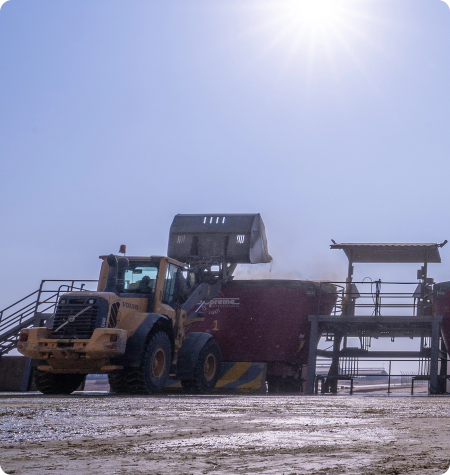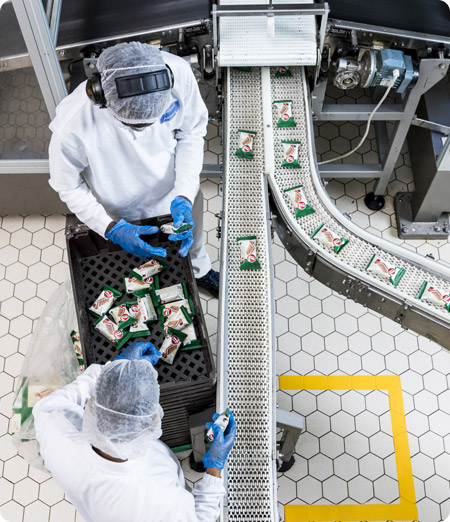Almarai understands the climate change related challenges and our greenhouse gas emissions associated with various aspects of operations. We are conscious of the inherent risks of climate change on food production, so we continually work to reduce the environmental impact of our business for long term sustainability. Climate change can challenge agricultural production through drought, pest, and diseases and threaten maintaining and increasing production levels over the long term. We therefore look to adjust our practices to enable us to meet our production needs now and in the future.
In 2020, Almarai’s energy team developed an ‘Energy Roadmap,’ outlining how Almarai will improve its energy performance through efficient energy consumption and generation from sustainable sources. This had the aim of reducing our impacts on climate change whilst reducing operational costs. The energy roadmap was linked to our energy strategy, which focuses on reducing our overall energy use through greater energy monitoring, reduced consumption, operational efficiencies, and reducing reliance on fossil fuels. This strategy and roadmap require an energy culture that is embedded in every employee.
Developing energy culture is a foundational element of our overall energy management strategy and ability to capitalize on technological solutions. We are striving to establish an energy center of excellence to serve as a collaborative knowledge sharing platform and to play an important role in driving initiatives as we work towards our strategic goals. Our energy culture focuses on three core elements: awareness, regular equipment maintenance and optimization, and continual process improvement. This culture is made accessible to our staff and is promoted through training sessions, governance structures, and the implementation of best practices.
One of the greatest impacts food production, manufacture, processing, and transportation can have on climate change comes through the use of refrigerant gases such as Chlorofluorocarbons (CFCs) that have a much larger impact on climate change than other emissions. Our cold chain distribution system relies upon refrigeration at all stages, from farm to shelf. We feel it is our duty to actively manage our use of refrigerants and have put in place an active program to limit, reduce, and replace harmful refrigerants, wherever possible. As part of this active program, we are seeking to replace the harmful CFCs refrigerants with alternatives such as HCFCs and HFCs, which not only perform better, but also reduce atmospheric emissions that contribute to global warming. Our refrigeration systems undergo continuous maintenance and monitoring to actively prevent leaks and improve response times should leakages occur.
In 2021, we continued the development of our energy management systems as part of our desire to achieve the ISO 50001 certification. We have been working on developing an ISO roadmap and conducted an audit by an external vendor to identify gaps. The identified gaps are used to develop a roadmap to set energy goals and commitment to comply with ISO 50001 requirements. Progress has been made in the head office and dairy and juice manufacturing sites, and we aim to certify all sites including Administration, Manufacturing, Sales, Distribution, and Logistics Divisions by 2025.
We have developed and implemented Almarai Energy Monitoring Systems (AEMS) across the GCC. In total, we have connected 75 locations to AEMS. Phase 1 of AEMS is helping us to record and monitor energy consumption across sales distribution centers, manufacturing facilities, and head office buildings. The systems give us a better understanding of our electrical energy use and trends, thus, enabling a more efficient decision-making. These systems work in conjunction with other energy efficiency projects including a steam efficiency project and a pilot project on combined evaporative cooling systems commenced in our dairy and juice operations

As part of our roadmap towards using cleaner energy, we have committed to not only reduce our direct emissions, but also to lower the indirect emissions from the electricity we use (‘scope 2’ emissions). We have been steadily upgrading our lighting systems to LED across two phases. Phase I of the LED upgrade program has been implemented with reductions on our lighting load at nearly 70%. Phase II of the program is at a planning phase. Once completed, we will have replaced more than 70,000 lights across our facilities.
We strive to accomplish our 2025 target to explore and trial alternative fuel vehicles for our sales fleet. In 2021, we used biofuel in over 400 vehicles to deliver our products across the UAE. Initially, we had planned to increase the size of our biofuel sales fleet within this market; however, we have faced challenges in securing a biofuel supply to meet our requirements. The introduction of biofuel vehicles remains dependent in large part on market biofuel supply as a result. In addition, we have set a target of increasing the share of electricity from clean energy sources across our Administration, Manufacturing, Sales, Distribution and Logistics Divisions to 20% by 2025. To reach this objective, we are exploring opportunities to install renewable energy facilities across our sites and increase our share of renewable energy from the grid. For example, since 2018 we have installed solar energy generation capacities at a number of sites, including 12 MVp solar project at our manufacturing site in Hail (KSA). As we approach 2022, we will continue to invest in our solar electricity network whilst also exploring new ways to utilize solar power to produce hot water.

In 2021, we continued to upgrade our sales depot cold store sites to be CFCs free and achieved our target of 100% CFCs free sales depots cold stores by 2025. Reducing CFC’s has a direct benefit on our overall emissions and helps to reduce the harmful effects on climate change. Our trials of alternatives to standard refrigerants have continued with the introduction of R290, a non-toxic refrigerant with zero ozone depletion potential and a low global warming potential. We plan to standardize our operations in 2022 to use this replacement gas if it is found to be effective. This will significantly reduce our impact.
In 2017, we started using biodiesel in a few sales vans in selected depots of our UAE operations. Just over a year later, in 2018, we expanded the project to cover all sales vans. Today, all of UAE sales routes, 406 vans to be exact, use biodiesel with a 5% blend into the regular filling, reaching 339,051 per year. In addition to use of biodiesel, we installed SDL trucks routing system, which enables us to optimize the distance travelled and save fuel. This initiative contributed to our reaching the target to increase the fuel efficiency of our sales, distribution, and logistics vehicles by 10% by 2025.
We implemented our energy awareness program, ‘Go Green’ at our site in Jeddah (KSA) in 2021. The same program has been operational at our manufacturing sites in Al Kharj and Hail (KSA). The key objectives of this program are to raise employee awareness for energy conservation, identify high energy use areas, conduct process improvements, and engage employees in energy conservation.
| Management commitment |
|---|
|
| Operational improvements |
|
| Engineering improvements |
|
| New technologies |
|

| Goal/Target | Progress |
|---|---|
| Transport and refrigeration | |
| Explore and trial alternative fuel vehicles for our sales transport fleet on an ongoing basis | |
| Increase the fuel efficiency of our sales, distribution and logistics vehicles by 10% by 2025 (against a 2018 baseline) | |
| 100% of our sales depot cold stores will be CFC free by 2025 | |
| Energy | |
| Reduce energy consumption across our Manufacturing, Sales, Distribution and Logistics Divisions by 15% from efficiency measures by 2025 (against a 2018 intensity baseline) | |
| Increase the share of electricity from clean energy sources across our Administration, Manufacturing, Sales, Distribution and Logistics Divisions to 20% by 2025 | |
| Achieve ISO 50001 certification for our Administration, Manufacturing, Sales, Distribution and Logistics Divisions by 2025 | |